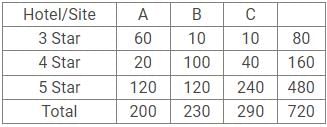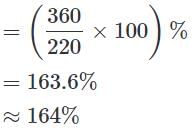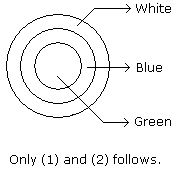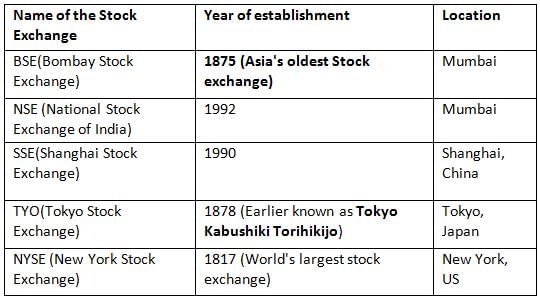SSC CGL (Tier II) Practice Test - 21 - SSC CGL MCQ
30 Questions MCQ Test - SSC CGL (Tier II) Practice Test - 21
Two pipes P and Q can fill a tank in 24 minutes and 27 minutes respectively. If both the pipes are opened simultaneously, after how much time should B be closed so that the tank is full in 8 minutes?
Directions: Study the following information carefully and answer the questions given beside.
Three online hotel booking website A,B and C listed some hotels on their websites. The all listed 3 star, 4 star and 5 star hotels. One hotel can be listed on exactly one website.
Further it is known that
- Total number of hotels listed on all three website together is 720.
- Total number of 4 star hotels is twice the total number of 3 star hotels on all the three websites taken together. Further, total number of 5 star hotels is thrice the total number of 4 star hotels on all three sites together.
- Out of 200 hotels listed on Websites A, 30% are 3 star hotels.
- Ratio of 5 star hotels on sites A,B and C are 1 : 1 : 2.
- Number of 5 star hotels on B website is 20% more than number of 4 star hotels on the same website.
- Number of 3 star hotels on website B and C are same.
Q. What is the total number of 4 star hotels from website A and C together ?
Three online hotel booking website A,B and C listed some hotels on their websites. The all listed 3 star, 4 star and 5 star hotels. One hotel can be listed on exactly one website.
Further it is known that
A tap drips at an average rate of 2 drops in 3 seconds. It takes 2080 drops of water to completely fill a hemispherical vessel of radius 8.3 cm. How many times can the vessel be filled in this manner in 13 hours?
The given rectangle ABCD has length 9 and width 5. Diagonal AC is divided into 5 equal parts at W, X, Y and Z. Find the area of the shaded region.

Directions: Study the table given below and answer the questions that follow:
Total Number of Employees in different Departments of an Organization and Percentage of Females and Males.
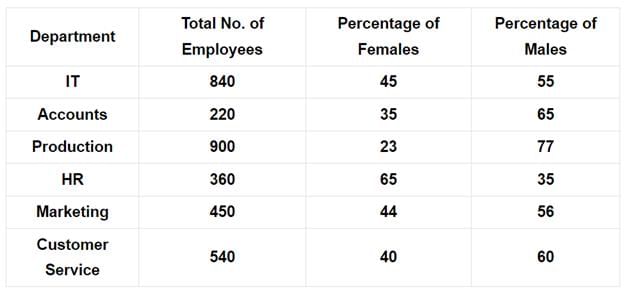
Q. The total number of employees in the HR department forms approximately what per cent of the total number of employees in the Accounts department?
Directions: Study the following information carefully and answer the questions given beside.
Three online hotel booking website A,B and C listed some hotels on their websites. The all listed 3 star, 4 star and 5 star hotels. One hotel can be listed on exactly one website.
Further it is known that
- Total number of hotels listed on all three website together is 720.
- Total number of 4 star hotels is twice the total number of 3 star hotels on all the three websites taken together. Further, total number of 5 star hotels is thrice the total number of 4 star hotels on all three sites together.
- Out of 200 hotels listed on Websites A, 30% are 3 star hotels.
- Ratio of 5 star hotels on sites A,B and C are 1 : 1 : 2.
- Number of 5 star hotels on B website is 20% more than number of 4 star hotels on the same website.
- Number of 3 star hotels on website B and C are same.
Q. Website D also started listing of Hotels on their site. Number of 3 star hotels on site D is 50% more than number of 4 star hotels on site A. Total number of hotels (3 star, 4 star and 5 star) on site D are 500, out of which 50% are 4 star. Find the number of 5 star hotels listed on site D.
Directions : Study the following bar chart carefully and answer the questions given below:
Given line graph shows the data of washing machines of different price range of various brands during Diwali festival.
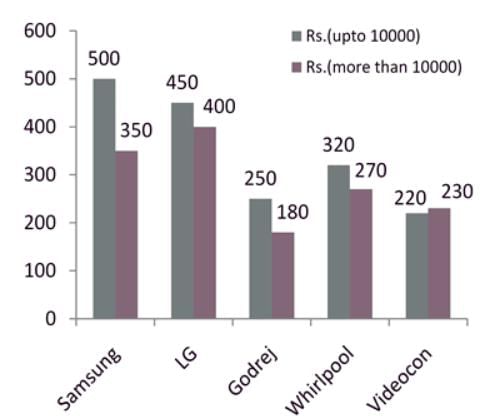
Q. Total sale of Samsung is what percentage more / less than total sale of Whirlpool?
Directions : Study the following bar chart carefully and answer the questions given below:
Given line graph shows the data of washing machines of different price range of various brands during Diwali festival.

Q. How many washing machines of price up to Rs. 10000 were sold in the festival?
40 persons are sitting in a row. How many persons are sitting between 31st person from left and 25th person from right?
Directions to Solve
In each of the following questions find out the alternative which will replace the question mark.
Question -
Peacock : India :: Bear : ?
Directions to Solve
In each of the following questions two statements are given. Which are followed by four conclusions (1), (2), (3) and (4). Choose the conclusions which logically follow from the given statements.
Question -
Statements: All green are blue. All blue are white.
Conclusions:
- Some blue are green.
- Some white are green.
- Some green are not white.
- All white are blue.
In the question symbols $, #, % are used for different meanings as follows.
$ means ‘neither greater nor equal to’.
# means ‘neither greater nor smaller than’.
% means ‘neither smaller nor equal to’.
In each of the following questions, assuming the given statements to be true, find out which of the two conclusions I and II given below them is/are definitely true.
Statements: T % I, I # L, L % U
Conclusions: I. T $ L
II. U $ T
Directions: This question given below is followed by two arguments numbered I and II. You have to decide which of the following arguments is a ‘strong’ argument and which is a ‘weak’ argument.
Statement:
Should corporal punishment be banned in schools?
Arguments:
I. No. Teachers as responsible adults can be trusted with using the punishment only as a last resort, and on a case-to-case basis.
II. Yes. Hitting a student is only an easy way out to create an image of trying to change the student, whereas there are better options available for fundamentally changing the behaviour of the student.
Directions: In the question given below, there is a group of letters followed by combinations of digits/symbols lettered (1), (2), (3) and (4). You have to find out which of the combinations correctly represents the group of letters based on the coding system and mark the letter of that combination as your answer.

Conditions:
(i) If both the first and the last letters are consonants, then all the vowels are to be coded as the code of E.
(ii) If both the first and the last letters are vowels, then both are to be coded by &.
(iii) If the first letter is a vowel and the last letter is a consonant, then their codes are to be interchanged.
PTUWT
Directions: Study the following information carefully and answer the given question.
In a certain code:
'chest teeth gap limb' is coded as Q&2 C%3 U#4 I?4
'borrow some corn people' is coded as F@3 0#3 X!5 F*5
'eat bank scheme tomato' is coded as P?5 L!3 U^2 F@5
'gossible come person gones' is coded as F#3 T&4 F&7 O*5
What will be the code for 'linguist paraglide emperor'?
The following questions have the last part of the sentence that has been deleted. You are required to choose an option that would complete the given sentences grammatically and contextually and mark the same as the correct answer.
Q. Conducted in November 2021 among students of more than one lakh schools in 720 districts, the NAS shows a sharp dip in the performance of students _____.
Directions: Read the passage given below and answer the questions that follow by choosing the correct/most appropriate options:
The day had broken cold and grey, exceedingly cold and grey, when the man turned aside from the main Yukon trail and climbed the high earth bank, where a dim and little travelled trail led eastward. It was a steep bank, and he paused for breath at the top, excusing the act to himself by looking at his watch. It was nine o'clock. There was no sun nor hint of sun, though there was not a cloud in the sky. It was a clear day, and yet there seemed an intangible pall over the face of things, a subtle gloom that made the day dark, and that was due to the absence of sun. This fact did not worry the man. He was used to the lack of sun. It had been days since he had seen the sun, and he knew that a few more days must pass before that cheerful orb, due south, would just peep above the skyline and dip immediately from view.
The man flung a look back along the way he had come. The Yukon lay a mile wide and hidden under three feet of ice. On top of this ice were as many feet of snow. It was all pure white, rolling in gentle, undulations where the ice jams of the freeze-up had formed. North and south, as far as his eye could see, it was unbroken white, save for a dark hairline that curved and twisted from around the spruce-covered island to the south, and that curved and twisted away into the north, where it disappeared behind another spruce-covered island. This dark hair-line was the trail--the main trail--that led south five hundred miles to the Chilcoot Pass, Dyea, and salt water; and that led north seventy miles to Dawson, and still on to the north a thousand miles to Nulato, and finally to St. Michael on the Bering Sea, a thousand miles and half a thousand more.
But all this--the mysterious, far-reaching hair-line trail. the absence of sun from the sky, the tremendous cold, and the strangeness and weirdness of it all--made no impression on the man. It was not because he was long used to it. He was a newcomer in the land, a chechaquo, and this was his first winter. The trouble with him was that he was without imagination. He was quick and alert in the things of life, but only in the things, and not in the significance. Fifty degrees below zero meant eighty-odd degrees of frost. Such fact impressed him as being cold and uncomfortable, and that was all. It did not lead him to meditate upon his frailty as a creature of temperature, and upon man's frailty in general, able only to live within certain narrow limits of heat and cold; and from there on it did not lead him to the conjectural field of immortality and man's place in the universe. Fifty degrees below zero stood forte bite of frost that hurt and that must be guarded against by the use of mittens, ear flaps, warm moccasins, and thick socks. Fifty degrees below zero was to him just precisely fifty degrees below zero. That there should be anything more to it than that was a thought that never entered his head.
As he turned to go on, he spat speculatively. There was a sharp, explosive crackle that startled him. He spat again. And again, in the air, before it could fall to the snow, the spittle crackled. He knew that _____ fifty below spittle crackled on the snow, but this spittle had crackled in the air. Undoubtedly it was colder than fifty below--how much colder he did not know. But the temperature did not matter. He was bound for the old claim on the left fork of Henderson Creek, where the boys were already. They had come over across the divide from the Indian Creek country, while he had come the roundabout way to take a look at the possibilities of getting out logs in the spring from the islands in the Yukon. He would be into camp by six o'clock; a bit after dark, it was true, but the boys would be there, a fire would be going, and a hot supper would be ready. As for lunch, he pressed his hand against the protruding bundle under his jacket. It was also under his shirt, wrapped up in a handkerchief and lying against his naked skin. It was the only way to keep the biscuits from freezing. He smiled agreeably to himself as he thought of those biscuits, each cut open and sopped in bacon grease, and each enclosing a generous slice of fried bacon.
Q. According to the passage, where had the man kept his lunch?
Directions: Read the passage given below and answer the questions that follow by choosing the correct/most appropriate options:
The day had broken cold and grey, exceedingly cold and grey, when the man turned aside from the main Yukon trail and climbed the high earth bank, where a dim and little travelled trail led eastward. It was a steep bank, and he paused for breath at the top, excusing the act to himself by looking at his watch. It was nine o'clock. There was no sun nor hint of sun, though there was not a cloud in the sky. It was a clear day, and yet there seemed an intangible pall over the face of things, a subtle gloom that made the day dark, and that was due to the absence of sun. This fact did not worry the man. He was used to the lack of sun. It had been days since he had seen the sun, and he knew that a few more days must pass before that cheerful orb, due south, would just peep above the skyline and dip immediately from view.
The man flung a look back along the way he had come. The Yukon lay a mile wide and hidden under three feet of ice. On top of this ice were as many feet of snow. It was all pure white, rolling in gentle, undulations where the ice jams of the freeze-up had formed. North and south, as far as his eye could see, it was unbroken white, save for a dark hairline that curved and twisted from around the spruce-covered island to the south, and that curved and twisted away into the north, where it disappeared behind another spruce-covered island. This dark hair-line was the trail--the main trail--that led south five hundred miles to the Chilcoot Pass, Dyea, and salt water; and that led north seventy miles to Dawson, and still on to the north a thousand miles to Nulato, and finally to St. Michael on the Bering Sea, a thousand miles and half a thousand more.
But all this--the mysterious, far-reaching hair-line trail. the absence of sun from the sky, the tremendous cold, and the strangeness and weirdness of it all--made no impression on the man. It was not because he was long used to it. He was a newcomer in the land, a chechaquo, and this was his first winter. The trouble with him was that he was without imagination. He was quick and alert in the things of life, but only in the things, and not in the significance. Fifty degrees below zero meant eighty-odd degrees of frost. Such fact impressed him as being cold and uncomfortable, and that was all. It did not lead him to meditate upon his frailty as a creature of temperature, and upon man's frailty in general, able only to live within certain narrow limits of heat and cold; and from there on it did not lead him to the conjectural field of immortality and man's place in the universe. Fifty degrees below zero stood forte bite of frost that hurt and that must be guarded against by the use of mittens, ear flaps, warm moccasins, and thick socks. Fifty degrees below zero was to him just precisely fifty degrees below zero. That there should be anything more to it than that was a thought that never entered his head.
As he turned to go on, he spat speculatively. There was a sharp, explosive crackle that startled him. He spat again. And again, in the air, before it could fall to the snow, the spittle crackled. He knew that _____ fifty below spittle crackled on the snow, but this spittle had crackled in the air. Undoubtedly it was colder than fifty below--how much colder he did not know. But the temperature did not matter. He was bound for the old claim on the left fork of Henderson Creek, where the boys were already. They had come over across the divide from the Indian Creek country, while he had come the roundabout way to take a look at the possibilities of getting out logs in the spring from the islands in the Yukon. He would be into camp by six o'clock; a bit after dark, it was true, but the boys would be there, a fire would be going, and a hot supper would be ready. As for lunch, he pressed his hand against the protruding bundle under his jacket. It was also under his shirt, wrapped up in a handkerchief and lying against his naked skin. It was the only way to keep the biscuits from freezing. He smiled agreeably to himself as he thought of those biscuits, each cut open and sopped in bacon grease, and each enclosing a generous slice of fried bacon.
Q. Which of the following is/are incorrect according to the given passage?
A. The man turned towards the main Yukon trail and climbed the high earth bank, where a dim and little-travelled trail led eastward.
B. The man was not used to the lack of sun.
C. He would be into camp by six o'clock and the boys would be there, a fire would be going, and a hot supper would be ready.
Directions: Read the passage given below and answer the questions that follow by choosing the correct/most appropriate options:
The day had broken cold and grey, exceedingly cold and grey, when the man turned aside from the main Yukon trail and climbed the high earth bank, where a dim and little travelled trail led eastward. It was a steep bank, and he paused for breath at the top, excusing the act to himself by looking at his watch. It was nine o'clock. There was no sun nor hint of sun, though there was not a cloud in the sky. It was a clear day, and yet there seemed an intangible pall over the face of things, a subtle gloom that made the day dark, and that was due to the absence of sun. This fact did not worry the man. He was used to the lack of sun. It had been days since he had seen the sun, and he knew that a few more days must pass before that cheerful orb, due south, would just peep above the skyline and dip immediately from view.
The man flung a look back along the way he had come. The Yukon lay a mile wide and hidden under three feet of ice. On top of this ice were as many feet of snow. It was all pure white, rolling in gentle, undulations where the ice jams of the freeze-up had formed. North and south, as far as his eye could see, it was unbroken white, save for a dark hairline that curved and twisted from around the spruce-covered island to the south, and that curved and twisted away into the north, where it disappeared behind another spruce-covered island. This dark hair-line was the trail--the main trail--that led south five hundred miles to the Chilcoot Pass, Dyea, and salt water; and that led north seventy miles to Dawson, and still on to the north a thousand miles to Nulato, and finally to St. Michael on the Bering Sea, a thousand miles and half a thousand more.
But all this--the mysterious, far-reaching hair-line trail. the absence of sun from the sky, the tremendous cold, and the strangeness and weirdness of it all--made no impression on the man. It was not because he was long used to it. He was a newcomer in the land, a chechaquo, and this was his first winter. The trouble with him was that he was without imagination. He was quick and alert in the things of life, but only in the things, and not in the significance. Fifty degrees below zero meant eighty-odd degrees of frost. Such fact impressed him as being cold and uncomfortable, and that was all. It did not lead him to meditate upon his frailty as a creature of temperature, and upon man's frailty in general, able only to live within certain narrow limits of heat and cold; and from there on it did not lead him to the conjectural field of immortality and man's place in the universe. Fifty degrees below zero stood forte bite of frost that hurt and that must be guarded against by the use of mittens, ear flaps, warm moccasins, and thick socks. Fifty degrees below zero was to him just precisely fifty degrees below zero. That there should be anything more to it than that was a thought that never entered his head.
As he turned to go on, he spat speculatively. There was a sharp, explosive crackle that startled him. He spat again. And again, in the air, before it could fall to the snow, the spittle crackled. He knew that _____ fifty below spittle crackled on the snow, but this spittle had crackled in the air. Undoubtedly it was colder than fifty below--how much colder he did not know. But the temperature did not matter. He was bound for the old claim on the left fork of Henderson Creek, where the boys were already. They had come over across the divide from the Indian Creek country, while he had come the roundabout way to take a look at the possibilities of getting out logs in the spring from the islands in the Yukon. He would be into camp by six o'clock; a bit after dark, it was true, but the boys would be there, a fire would be going, and a hot supper would be ready. As for lunch, he pressed his hand against the protruding bundle under his jacket. It was also under his shirt, wrapped up in a handkerchief and lying against his naked skin. It was the only way to keep the biscuits from freezing. He smiled agreeably to himself as he thought of those biscuits, each cut open and sopped in bacon grease, and each enclosing a generous slice of fried bacon.
Q. Choose the Antonym of the word 'conjecture'.
Directions: Rearrange the following sentences (A), (B), (C), (D), and (E) in the proper sequence to form a meaningful paragraph; then answer the questions given below them.
A. Although the company’s vaccine is less effective at preventing COVID-19 than Moderna’s and Pfizer’s versions are, it still surpasses the US Food and Drug Administration’s 50 percent efficacy requirement for emergency use approval.
B. The one-shot vaccine could be a “game changer,” Jonathan Temte, a vaccine expert at the University of Wisconsin School of Medicine and Public Health, tells The Washington Post, because it could simplify vaccine distribution.
C. And unlike rival vaccines that are administered as two doses, Johnson’s and Johnson’s vaccine requires just a single injection.
D. Johnson & Johnson announced on January 29 that its one-shot vaccine is 85 percent effective against severe COVID-19 disease.
E. In addition, Johnson & Johnson’s vaccine doesn’t need to be stored in temperatures as cold as Moderna and Pfizer’s versions.
Q. Which sentence will come in the third place after rearrangement?
Direction: In the following passage, some words have been left out. Read the passage carefully and select the correct answer for the given blank out of the given alternatives.
A deal was ready to be (1) _______ (signed) on September 8, with a Taliban (2) _______ (group) scheduled to travel to Camp David, but was (3) _______ (stopped) because of the death of a US soldier in a car bomb attack. Trump also wanted to (4) _______ (avoid) the negative (5) _______ (perception) of welcoming a Taliban delegation to Camp David during the week that marks the 9/11 attacks anniversary.
Q. Which of the following words fits the blank labelled as (3)?
Directions: Find out the most effective word from the given options to fill the blanks of the following questions.
- IRCTC _______ up with Amazon India to offer reserved train bookings.
- Melissa _______ with Leong in order to gain entry into the singing competition.
In the following question, a passage is given with six words given as bold and labelled as A, B, C, D, E and F. You have to choose the word from the given options which grammatically and contextually replaces the bold part.
China is expanding its nuclear force much fast(A) than US officials predicted just a year ago, highlighting a broad and decelerating (B) buildup of military muscle designed to enable Beijing to match or surpass US global power by mid-century, according to a Pentagon report released Wednesday.
The number of Chinese nuclear warheads could increase to 700 within six years, the report said, and may top 1,000 by 2030. The report did not say how many weapons China has today, but a year ago the Pentagon said the number was in the “low 200s” and was likelihood (C) to double by the end of this decade.
The United States, by comparison, has 3,750 nuclear weapons and has no plans to increase. As recently as 2003 the US total was about 10,000. The Biden administration is undertaking (D) a comprehensive review of its nuclear policy and has not said how that might be influenced by its China concerns.
The report does not suggest open amicable(E) with China but it fits an emerging U.S. narrative of a People’s Liberation Army, as China calls its military, intent on challenging the United States in all domains of warfare — air, land, sea, space and cyberspace. Against that backdrop, U.S. defense officials have said they are increasingly weary (F) of China’s intentions with regard to the status of Taiwan.
Q. (C). ?
Which Indian state launched the 'Ama Pokhari' scheme?
Who was the first Indian to qualify for the Indian Civil Service?
The gas usually causing explosions in coal mines is –
Which of the following statements is/are correct regarding Exim Bank?
- It provides financial advice and counseling services for internationalisation of business of Indian companies which are foreign oriented.
- It provides working capital term loan to export-oriented units.
- It extends buyers' credit and lines of credit
Which of the following is the oldest stock exchange in Asia?
Which programming language is known for its simplicity, readability, and ease of learning?
__ was the precursor to internet as we know it today?


